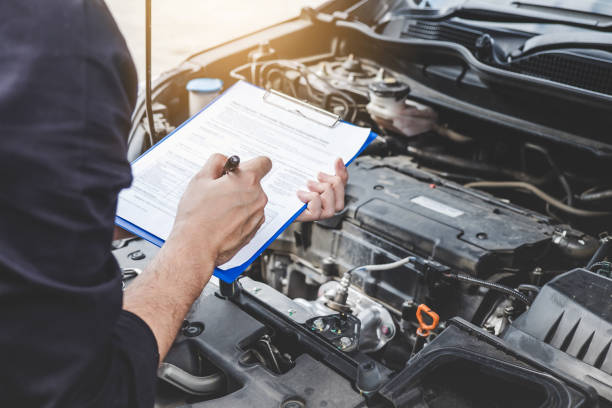
When it comes to vehicle maintenance, ensuring that your brakes are in top condition is one of the most important tasks you can do for both your safety and the safety of others on the road. Car brake repairs might not always be on the top of your mind, but keeping your brake system in good shape is crucial for smooth driving. In this article, we’ll explore the common brake problems, how to identify them early, and the best ways to maintain your brakes.
Common Brake Problems and Their Causes
Your car’s brake system is made up of various components, each playing a critical role in ensuring your vehicle stops safely. Over time, brake pads wear down, brake fluid degrades, and other parts can become damaged. Here are some common brake issues to watch out for:
1. Worn Brake Pads
One of the most frequent reasons for brake repairs is worn-out brake pads. Brake pads press against the rotors to create friction, which slows the car down. As they wear, they lose their ability to stop your car efficiently. Signs of worn pads include squealing or squeaking noises, longer stopping distances, or a pulsating brake pedal.
2. Brake Fluid Leaks
Your brake system relies on hydraulic fluid to transfer the pressure from your foot on the pedal to the braking components. If you notice a soft brake pedal or a low brake fluid level, it may indicate a leak in the system. Leaking brake fluid can be dangerous, as it reduces the effectiveness of your brakes.
3. Brake Rotor Issues
Brake rotors can become warped or damaged over time, especially if you constantly apply the brakes hard. If you feel vibrations or hear grinding noises when braking, this could be a sign of worn-out rotors, and they may need to be resurfaced or replaced.
4. Caliper Problems
The brake calipers clamp down on the brake pads to create friction. If the calipers are damaged or malfunctioning, your vehicle may pull to one side when braking, or you might notice uneven wear on the brake pads.
5. Frozen or Sticking Brake Components
In colder climates, brake components like the calipers and pistons can freeze or get stuck. This may cause the brakes to drag, leading to poor performance, excessive wear, and overheating. Regular maintenance can help prevent this issue.
Signs You Need Brake Repairs
It’s essential to stay on top of your brake system’s health to avoid dangerous situations. Some signs that you need brake repairs include:
-
Grinding or Squealing Noises: If you hear high-pitched squeals when applying the brakes, it may be time to replace the brake pads. Grinding noises indicate that the pads are severely worn, and the metal components are rubbing together.
-
Unusual Vibrations or Pulling: If your vehicle pulls to one side or you feel vibrations in the brake pedal when stopping, it could indicate issues with the brake pads, calipers, or rotors.
-
Soft or Hard Brake Pedal: If the brake pedal feels softer than usual, it might be a sign of air or moisture in the brake fluid, or there could be a fluid leak. A hard pedal could indicate problems with the master cylinder.
-
Warning Lights: Modern cars come equipped with brake warning lights on the dashboard. If this light turns on, you should schedule a brake inspection as soon as possible.
How to Maintain Your Car’s Brakes
Preventing brake issues can save you time, money, and potentially dangerous situations on the road. Here are a few tips to keep your brakes in optimal condition:
1. Inspect Your Brakes Regularly
It’s always a good idea to have your brakes inspected during routine vehicle servicing. A professional can check the brake pads, rotors, fluid levels, and other components to catch any issues early before they become major problems.
2. Drive Carefully
Aggressive driving, like rapid acceleration or heavy braking, can put undue stress on your brakes. Try to drive smoothly and avoid slamming on the brakes unless necessary. This will help extend the life of your brake pads and rotors.
3. Check Brake Fluid Regularly
Keep an eye on your brake fluid levels and top them up when needed. Low fluid levels could indicate a leak, so it’s important to get that checked out immediately.
4. Replace Brake Pads on Time
Most brake pads last anywhere from 25,000 to 70,000 miles, depending on your driving habits and the type of vehicle. Replacing brake pads on time is one of the best ways to avoid expensive brake repairs and maintain your car’s performance.
Finding a Reliable Brake Repair Shop
If you’re unsure whether your brakes need repairs or if you’re in need of a brake inspection, visit a trusted mechanic. You can even search for a “Tyre shop near me“ that offers brake services. Many tyre shops also provide comprehensive vehicle maintenance, including brake inspections, pad replacements, and other repairs. A one-stop-shop can save you time and effort while ensuring your car stays in excellent condition.
Conclusion
Car brake repairs are essential for the safety of both the driver and passengers. By staying aware of the common signs of brake issues and taking preventative measures, you can extend the lifespan of your brake system and avoid costly repairs. Whether you need to replace worn-out brake pads or are dealing with a more severe issue, don’t delay in seeking professional help. If you’re looking for a reliable place to get your brakes checked, simply search for a “Tyre shop near me“, and you’ll likely find a service that can take care of both your tyres and brakes in one go.



Leave a Reply